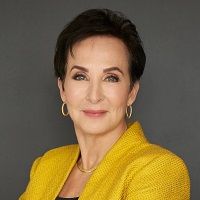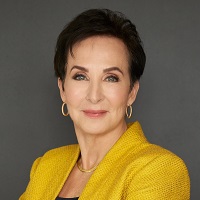How to Age-Proof Your Career as Workplace Ageism Increases
Diversifying your networking, staying on top of advances (tech and otherwise) and sharing what you know can help protect you against age discrimination.


Profit and prosper with the best of Kiplinger's advice on investing, taxes, retirement, personal finance and much more. Delivered daily. Enter your email in the box and click Sign Me Up.
You are now subscribed
Your newsletter sign-up was successful
Want to add more newsletters?

Delivered daily
Kiplinger Today
Profit and prosper with the best of Kiplinger's advice on investing, taxes, retirement, personal finance and much more delivered daily. Smart money moves start here.

Sent five days a week
Kiplinger A Step Ahead
Get practical help to make better financial decisions in your everyday life, from spending to savings on top deals.

Delivered daily
Kiplinger Closing Bell
Get today's biggest financial and investing headlines delivered to your inbox every day the U.S. stock market is open.

Sent twice a week
Kiplinger Adviser Intel
Financial pros across the country share best practices and fresh tactics to preserve and grow your wealth.

Delivered weekly
Kiplinger Tax Tips
Trim your federal and state tax bills with practical tax-planning and tax-cutting strategies.

Sent twice a week
Kiplinger Retirement Tips
Your twice-a-week guide to planning and enjoying a financially secure and richly rewarding retirement

Sent bimonthly.
Kiplinger Adviser Angle
Insights for advisers, wealth managers and other financial professionals.

Sent twice a week
Kiplinger Investing Weekly
Your twice-a-week roundup of promising stocks, funds, companies and industries you should consider, ones you should avoid, and why.

Sent weekly for six weeks
Kiplinger Invest for Retirement
Your step-by-step six-part series on how to invest for retirement, from devising a successful strategy to exactly which investments to choose.
Almost 40 years ago, I stepped into my first role as a CEO with a national auto parts chain that was facing bankruptcy. Thanks to my reputation as a problem-solver, the board of directors decided to bring me on — an unusual choice at a time when women were often relegated to making coffee and typing up notes. There was a great deal of pressure to perform, but my strategy of hiring local talent from the neighborhood and training them on auto parts quickly slowed the volume of products being stolen from the shelves. Within a year, the financial outlook for the chain was reversed.
My first major challenge as a CEO provided me with invaluable lessons. Over the years, we all build up a hard-won library of problems/solutions and learnings that we’ve worked through whether it’s as a CEO, a salesperson or a caregiver. While technology has changed the face of business in many ways, there are still the same basic factors and levers that come into play again and again.
Older employees have seen these patterns before and have the experience of navigating them and the knowledge to construct solutions based on past successes. Combined with emotional intelligence, facility with multitasking and a resourcefulness developed from decades without digital tools, older employees provide many important benefits to a workplace. And yet, ageism in the workplace is not only increasing, but is at an all-time high.
From just $107.88 $24.99 for Kiplinger Personal Finance
Become a smarter, better informed investor. Subscribe from just $107.88 $24.99, plus get up to 4 Special Issues

Sign up for Kiplinger’s Free Newsletters
Profit and prosper with the best of expert advice on investing, taxes, retirement, personal finance and more - straight to your e-mail.
Profit and prosper with the best of expert advice - straight to your e-mail.
Age discrimination is rising along with increase of older employees
Over the past two decades, the median age in the U.S. has continued to rise even as overall labor force participation is projected to decrease. By 2030, adults 75 and over are the only workforce group projected to increase in the U.S., growing 96.5%, according to the Bureau of Labor Statistics.
However, as an increasing number of older employees are continuing their careers for longer and are returning to the workforce, ageism has become a rising issue. In fact, an AARP poll found that 78% of U.S. employees 50 years or more have seen or experienced age discrimination in their workplace — the highest level in 20 years.
When I first began my career, everyone would assume the oldest man in the room was the one in charge. While companies no longer adhere to that hierarchical norm, we now see the pendulum swinging in the opposite direction. However, a rich, complementary workforce requires employees of all ages. Older, experienced employees in particular have the important role of passing along critical thinking, best practices and industry knowledge to their younger colleagues.
Employees who are tasked with navigating their business through a potential recession, for example, can discuss scenarios with an older colleague who has navigated through high interest rates and recessionary turns in the past. There is also tremendous value inherent in a workplace mentor who has perspective and can say with confidence, “I’ve made that mistake — here’s how I fixed it.”
What can you do to age-proof your career?
Combating ageism is not just a matter of being “fair” to employees — it’s critical in order to build a vibrant, adaptable, effective workforce. Unfortunately, while many employers realize the benefits of a balanced workforce, ageism remains a growing issue and one that is very difficult to root out despite legal protections. There are, however, some important habits you can develop now that will contribute to your career longevity and help you protect against age discrimination in the future:
Network and stay in touch. Never has it been easier to network than it is today, and never has it been more important. Building a robust network gives you access to valuable insights and advice while also enhancing your visibility and credibility in your industry, leading to new opportunities, resources and potential job avenues and offers.
Also think about how you are building your network. Connecting with colleagues at business functions is obvious, but are you gravitating toward certain ages or titles? Expand your horizons and make a conscious effort to engage with a range of professionals in your industry across many generations.
And, while nothing will ever beat face-to-face networking, there is a definite benefit to attending online organizations, webinars and events that allow you to share ideas with colleagues and peers from around the world with minimal effort.
Lastly, I’ve found it extremely valuable to network in social situations such as my local gym, where I mentor a vibrant group of women who keep me apprised of local business activities and news.
Share what you know. Find what you are passionate about and share it with others, cultivating something that is completely yours and that showcases your insights or skills. Whether it’s a collection, a sport or even a weekly podcast, create something that transcends your job role and demonstrates who you are.
For example, as the CEO of a company on the forefront of therapeutic wellness, I am ensuring we are rapidly adding scientific evidence and real-life successes to this field. I use my LinkedIn platform to share information about hormone optimization, preventive care and the latest in evidence-based longevity medicine. This commitment to fostering scientific research that will profoundly impact how we live and age is at the core of my professional identity.
Always be learning. Unfortunately, there will always be the stereotype of older employees struggling with technology — especially today when the youngest generation of workers were literally born with technology at their fingertips. The older you are, the more imperative it is to defy these assumptions and actively engage in learning.
Take advantage of courses and training to ensure you are not just keeping up with technological advancements, but are surpassing them.
Even better, demonstrate that your hunger for learning extends beyond technology and into all aspects of professional growth. With technology moving so fast, you may find your young co-worker is just as unfamiliar with the new billing system as you are.
Showing your desire to learn new skills and programs is essential to defy the persistent stereotypes of older workers in the workplace.
An extended work landscape is here to stay
Rapid advances in longevity medicine combined with a proactive approach to personal health have shattered preconceptions about aging. As individuals intensify their focus on preventive care and extend better health and vitality to later years, there is often a corresponding desire to continue contributing professionally even beyond the traditional retirement age. Leveraging accumulated experience and skills is a collective investment necessary for any competitive workforce.
Fortunately, with strategic foresight and relentless career development, we can all ensure that no matter our age we can continue making impactful, respected contributions throughout our professional journey.
Related Content
- What 89% of Workers Are Willing To Give Up Their Job For
- New Employment Guidance Proposed on Hostile Work Practices: The Kiplinger Letter
- How to Spot a Drama Addict at Work (and What to Do About It)
- Three Ways to Lessen Financial Stress and Create Work-Life Balance in 2024
- Don’t Let Menopause Derail Your Career
Profit and prosper with the best of Kiplinger's advice on investing, taxes, retirement, personal finance and much more. Delivered daily. Enter your email in the box and click Sign Me Up.

Terry Weber, CEO and executive consultant, has transformed the business models of health care, retail and automotive industry giants. Terry is known for being a disruptive leader, building extraordinary, high-performing, high-functioning teams and successfully navigating diverse industry sectors, seamlessly adapting them to the changing landscape of business and technological innovation.
-
 How Much It Costs to Host a Super Bowl Party in 2026
How Much It Costs to Host a Super Bowl Party in 2026Hosting a Super Bowl party in 2026 could cost you. Here's a breakdown of food, drink and entertainment costs — plus ways to save.
-
 3 Reasons to Use a 5-Year CD As You Approach Retirement
3 Reasons to Use a 5-Year CD As You Approach RetirementA five-year CD can help you reach other milestones as you approach retirement.
-
 Your Adult Kids Are Doing Fine. Is It Time To Spend Some of Their Inheritance?
Your Adult Kids Are Doing Fine. Is It Time To Spend Some of Their Inheritance?If your kids are successful, do they need an inheritance? Ask yourself these four questions before passing down another dollar.
-
 The 4 Estate Planning Documents Every High-Net-Worth Family Needs (Not Just a Will)
The 4 Estate Planning Documents Every High-Net-Worth Family Needs (Not Just a Will)The key to successful estate planning for HNW families isn't just drafting these four documents, but ensuring they're current and immediately accessible.
-
 Love and Legacy: What Couples Rarely Talk About (But Should)
Love and Legacy: What Couples Rarely Talk About (But Should)Couples who talk openly about finances, including estate planning, are more likely to head into retirement joyfully. How can you get the conversation going?
-
 How to Get the Fair Value for Your Shares When You Are in the Minority Vote on a Sale of Substantially All Corporate Assets
How to Get the Fair Value for Your Shares When You Are in the Minority Vote on a Sale of Substantially All Corporate AssetsWhen a sale of substantially all corporate assets is approved by majority vote, shareholders on the losing side of the vote should understand their rights.
-
 How to Add a Pet Trust to Your Estate Plan: Don't Leave Your Best Friend to Chance
How to Add a Pet Trust to Your Estate Plan: Don't Leave Your Best Friend to ChanceAdding a pet trust to your estate plan can ensure your pets are properly looked after when you're no longer able to care for them. This is how to go about it.
-
 Want to Avoid Leaving Chaos in Your Wake? Don't Leave Behind an Outdated Estate Plan
Want to Avoid Leaving Chaos in Your Wake? Don't Leave Behind an Outdated Estate PlanAn outdated or incomplete estate plan could cause confusion for those handling your affairs at a difficult time. This guide highlights what to update and when.
-
 I'm a Financial Adviser: This Is Why I Became an Advocate for Fee-Only Financial Advice
I'm a Financial Adviser: This Is Why I Became an Advocate for Fee-Only Financial AdviceCan financial advisers who earn commissions on product sales give clients the best advice? For one professional, changing track was the clear choice.
-
 I Met With 100-Plus Advisers to Develop This Road Map for Adopting AI
I Met With 100-Plus Advisers to Develop This Road Map for Adopting AIFor financial advisers eager to embrace AI but unsure where to start, this road map will help you integrate the right tools and safeguards into your work.
-
 The Referral Revolution: How to Grow Your Business With Trust
The Referral Revolution: How to Grow Your Business With TrustYou can attract ideal clients by focusing on value and leveraging your current relationships to create a referral-based practice.